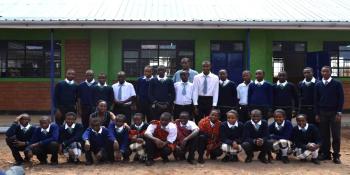
Boosting school enrollment in Mukima
Mukima is located in Nanyuki area of the Laikipia County in Kenya. The area never had a high school and children walked long distances, 20 kilometers or more, to study in neighboring villages. As a result, secondary school enrolment in Mukima was at 60%. Lower than a national average.
Habitat for Humanity Kenya received a grant from Samsung South Korea to finish construction of a secondary school in the community. The school idea was proposed by the decentralized local development structure known as Constituency Development Fund (CDF) in 2010. It brings together community leaders and local authorities. Local community thought that a high school for students aged 14-18 was of primary importance. The community donated land for construction, and the CDF provided funds to start building two classrooms. But this did not answer the need.
The school needed additional classrooms to host 180 students and 8 to 10 teachers as well as kitchen and sanitation facilities. Habitat Kenya and Samsung partnership aimed to address the gap. The project helped construct four additional classrooms, put finishing works on the first two classrooms, build a multipurpose hall for administration, staff and kitchen, and install separate ecologically friendly toilets, a 20,000-liter water tank, and solar panels for electricity.
The school was built with the use of inter-stabilizing soil blocks. The stabilized soil blocks are made from earth, cement and water. Clay soil is sticky and more susceptible to cracking, so sand is usually added as a blending agent to soils with high clay content. Unlike conventional soil bricks which are burnt in order to harden, the stabilized soil blocks do not require use of firewood, making it environment-friendly. They are produced by a portable block-building Hydraform machine right on the construction site. They are also cheaper than other construction methods and thus can significantly lower construction costs.
By using stabilized soil blocks for the school construction, the project has served as an embryo for learning both for the community and for the students of a nearby Nanyuki Technical Institute. Trainees and local artisans were equipped with construction skills for institutional and residential buildings using stabilized soil blocks.
The project provided an opportunity to the local community to learn affordable building technology and train 150 women and young people with construction skills and block making techniques.